
Relationship Indicators 2022
Relationships Australia Victoria, as part of the Relationships Australia National Federation, is pleased to share the results of our nationally representative survey into the state of relationships in Australia. These findings will inform our efforts to support all Australians to achieve positive and respectful relationships.
Background
Relationships Australia previously conducted the Relationships Indicators Survey from 1998-2011. In response to the enormous effects of the pandemic and other challenges in recent years, we recognised a shift in relationships and were interested in gaining a better understanding of these changes at a national level.
In response, Relationships Australia decided to reinvigorate the project with a renewed focus on research design and method.
The new survey
Relationships Australia has sought to develop a national survey which explored the ‘most important, meaningful’ relationship people have in their lives. Traditionally, many may assume that a person’s partner would take on this role. Although for many of our participants this was the case, we also felt it was important to capture the incredible connection people have outside of partnered relationships and explore the difficulties and challenges these relationships face.
The survey also explores people’s experiences with partnered relationship breakdown and bereavement, as well as other emerging relationship issues. Finally, we focused on people’s social identities, by exploring the roles that group relationships play in our lives.
To design the survey, we used a panel of experts from across our Federation and beyond. This resulted in a survey with a variety of rigorous measures, validated tools and some questions to test our own assumptions as service providers. Responses were collected by Life in Australia™ – Australia’s most methodologically rigorous panel.
Our approach produced findings which are broadly applicable to the Australian population. Despite this, we recognise that distilling relationships, which are so personal and infinitely subjective, into a short, summative report is a difficult task. As such, we plan to use this research as a launching point for more in-depth work.
For now, we hope the findings of this research can start a larger conversation about the integral role relationships play across the lifespan, and the kinds of supports that all Australians need to achieve respectful, enduring relationships.
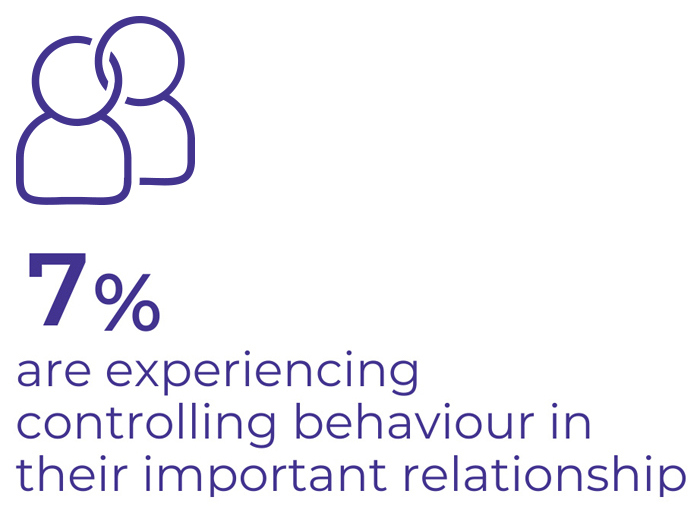
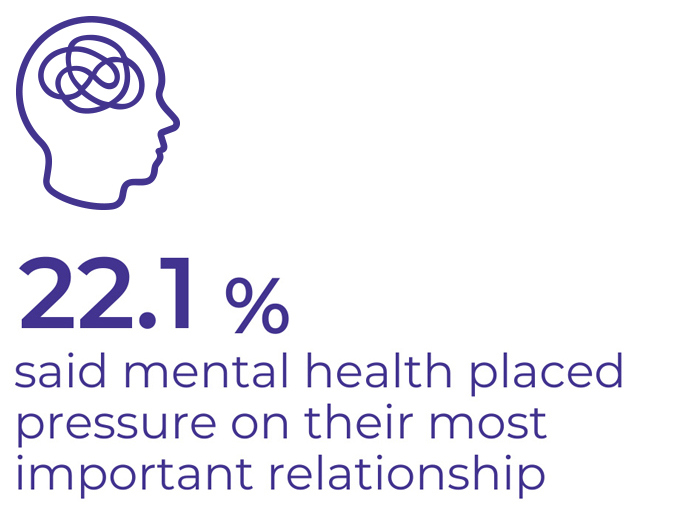
Key findings
- Australians have a variety of important, meaningful connections. Australians are very satisfied with these relationships.
- Satisfying relationships lead to greater subjective wellbeing and can predict satisfaction with life more generally.
- External pressures are placing a significant strain on relationships, affecting some groups more than others.
- The effects of mental ill-health were pervasive across relationships, being a major pressure in itself for 22.1% of people, and a cause and consequence of other pressures.
- The effects of mental ill-health were pervasive across relationships, being a major pressure in itself for 22.1% of people, and a cause and consequence of other pressures.
- Loneliness is increasing in Australia. One in five Australians say they often feel lonely and levels of social loneliness are high across the whole population.
- 1.7 million Australians feel unsafe disagreeing with their most important person, with older Australians least likely to say they feel safety in their relationships.
- Experiences with grief and loss in a partner relationship have significant ongoing effects on future relationships.
- Men are struggling to connect emotionally and socially and create strong relationships, with one in five men feeling emotionally lonely and one in three feeling socially lonely.
- Having a strong and reliable relationship improves subjective wellbeing, reduces loneliness, and enhances mental health.
- Satisfying relationships are good for wellbeing. The more satisfactory someone's important relationship was, the better their subjective wellbeing.
- People who could rely on one strong relationship for a variety of social supports had better life satisfaction.
- People who could rely on one strong relationship had better mental health over the past six months.
- People who could rely on one strong relationship were 1.4 times less lonely than those who relied on many different relationships.
- Australians have very low rates of help-seeking to address relationship issues, with 46.2% preferring to manage these challenges on their own.
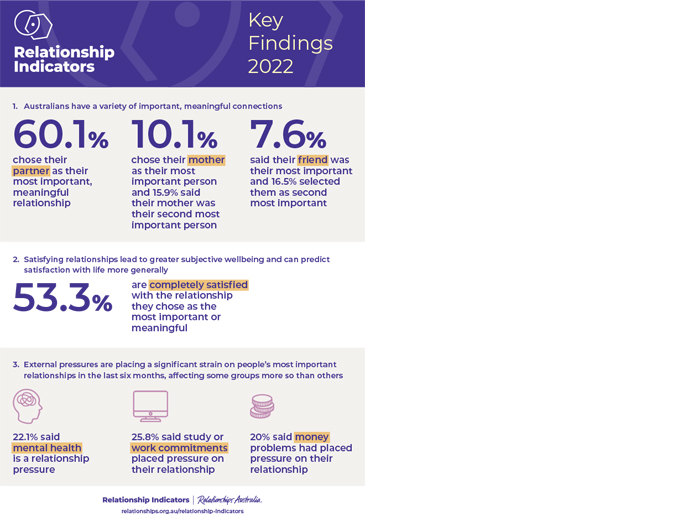
These findings highlight the importance of relationship services and other mechanisms which empower people to overcome challenges in their relationships.
There is no right way to 'do' relationships. Some relationships come easily, while others must be constantly renegotiated and explored. Relationships change throughout the lifetime, especially as other social realities shift.
Looking forwards
This report has demonstrated the integral role relationships play on our health, wellbeing and happiness. It has also explored how pressures challenge relationships, affective some sub-populations more than others. It has highlighted the need for supports which help all Australians nurture their relationships, to provide everyone with the opportunity to create respectful, enduring and fulfilling connections throughout the lifetime.
Relationships Australia Victoria believes that that people, in all their diversity, have the right to live their lives safely and with dignity, with their families and within their communities, and to enjoy positive, respectful, safe and fulfilling relationships. The findings from this research will be used to support Relationships Australia service provision and advocacy efforts to help achieve this goal.
Learn more
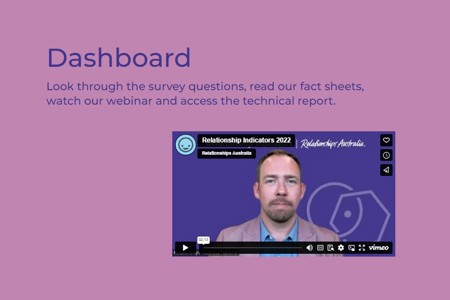
Explore the dashboard
Look through the survey questions, read our fact sheets, watch our webinar and access the technical report.
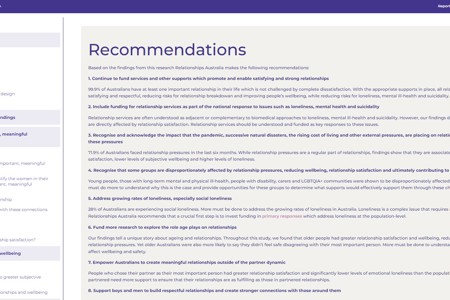
Recommendations
Read Relationships Australia's recommendations based on the findings from this research.
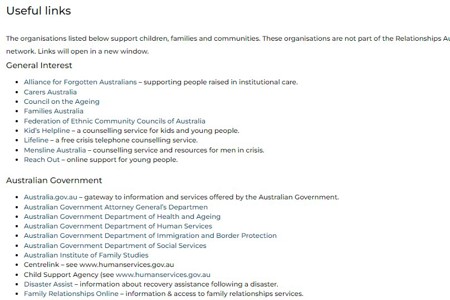
Support resources
If you need support in relation to the issues mentioned throughout this report, please view this list of useful resources.
Read more about our research and evaluation work

Research and evaluation
Read about our evidence-informed approach, view our Theory of Change video and download our Social Impact Report.

Current projects
We're currently undertaking research and evaluation projects across a range of areas related to family relationships.

Family dispute resolution: What the research says
Through continuous research and evaluation, we continue to refine family dispute resolution (FDR) and demonstrate its profound and positive impact.
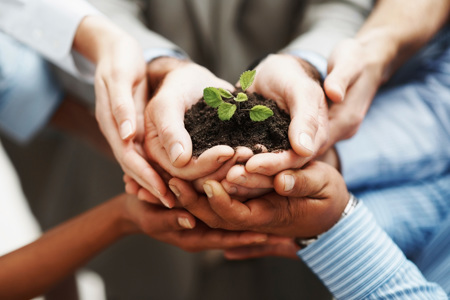
Our dedicated research and evaluation team
Driving collaborative design, development and implementation of our outcome measurements and evaluations.

Presentations, webinars and publications
We're committed to knowledge sharing and contributing to sector-wide continuous improvement. We regularly share our research and evaluation learnings at conferences and events and through webinars and podcasts.

Previous projects
For over a decade, we've conducted a wide range of research and evaluation projects, including major projects funded by the Australian Research Council.

Research and evaluation summaries
These summaries are designed to share the outcomes of key projects and initiatives relating to our services, clients and community needs.